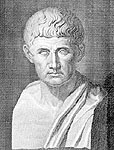Chapter 32. "The Sea-Fight Tomorrow" by Aristotle

Aristotle, Antiquities Project
About the author…
Aristotle (384-322) studied for twenty years at Plato's Academy in Athens. Following Plato's death, Aristotle left Athens, studied z÷ology and, for a while, was tutor to the young Alexander of Macedonia. Returning to Athens, he founded the Lyceum and the first great library of the ancient world. Here, it is said, he earned the name of the "peripatetic philosopher" from his propensity to think and lecture as he walked. His views on logic still shape the structure of the science.
About the work…
In his On Interpretation,[1] Aristotle outlines the basis for what has been designated since the Middle Ages the "Square of Opposition" under the assumption that statements have existential import.[2] Statements involving future possibilities pose unique problems for logic, and there have been many attempts to develop a consistent and reasonably complete temporal logic. In this reading selection, Aristotle concludes that sentences about the future do not quality as being statements at all since, strictly speaking they have no truth value—hence, the all-important law of the excluded middle is not in question. On this view, sentences concerning future contingencies involve possibility. Yet, there is more to the story when the question of future truths is related to the metaphysical presuppositions when "actuality" and "potentiality" used in a logic system.
Ideas of Interest from On Interpretation
Clarify what a universal statement is. (You might have to use a reference work or a standard logic text.)
What is the technical definition of "contradiction"? State one or two examples of contradictory statements.
Explain what it would mean for events to happen because of necessity? Try to clarify what "necessity" would mean on this view. Would a difference between logical and physical necessity help here? The sea-battle either takes place tomorrow or it does not take place tomorrow. If truth is not dependent on the time something happens, then it is true now (or false, as the case may be) from a metaphysical point of view that the sea-battle takes place tomorrow even though I cannot know this at the present time. Aren't there many other kinds of truths, that I either do not know now or cannot, in principle, know?
Does Aristotle's distinction between actuality and potentiality solve the problem of future truths? Explain his distinction with respect to statements about the future? Is the difficulty of understanding the nature of the referents of future truths being "passed off" to the difficulties inherent in the problem of existential import?